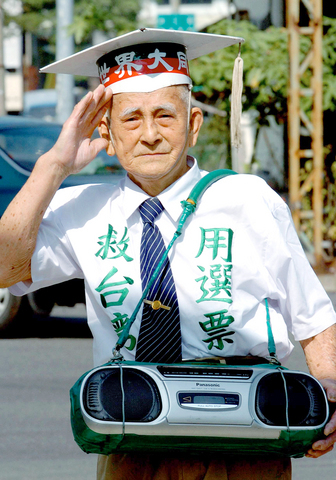Former Presidential Office secretary-general Yu Shyi-kun yesterday won a convincing victory in the Democratic Progressive Party (DPP) chairmanship election, garnering 54.4 percent of the vote.
Yu announced his victory over his two rivals in front of his residence at about 6pm, saying the election outcome showed that the DPP and its members were determined to implement reforms and move forward.
"I will invite other talent in the party to contribute their wisdom and effort and work for Taiwan and the DPP's future together," Yu said.

PHOTO: CHANG CHIA-MING, TAIPEI TIMES
Yu received 25,397 votes, comfortably in front of DPP Legislator Chai Trong-rong (
The election was marred, however, by the less-than-enthusiastic turnout. Only 44,872 people voted, which amounted to only one-fifth of the party's membership that were eligible to vote.
The DPP has about 530,000 members, but only some 234,000 were able to vote in today's election. Because they had failed to pay annual fees, the remainder forfeited their right to participate.
At a 7pm news conference, acting DPP chairwoman Annette Lu (
"For the new chairman there is still a long way to go and many tasks awaiting him," Lu said. "But I believe that Yu's seasoned political experience will lead the DPP to regain the faith of the people of Taiwan and repolish the party's signboard of integrity, just as was the case with the former chairman's ... vigor and energy."
The election was held after the resignation of former chairman Su Tseng-chang (
Within only a year, the DPP has now held two elections for chairman. President Chen Shui-bian (
Commenting on the low turnout, Yu said that the situation was in fact pleasing because it proved that DPP members had not been mobilized inappropriately and that most voters "voluntarily" cast their ballots.
He said that party members needed to have their commitment rekindled and that this was another responsibility he would accept.
Yu also said that he called Chai and Wong to express his best wishes and to invite them to promote reform together.
"It is impossible to carry out campaign platforms on my own; it requires the collective effort and wisdom of many colleagues," Yu said, adding that he would visit Su soon to solicit ideas.
Chai, who attended the news conference, said he accepted the result and would coordinate with Yu to facilitate the implementation of party reform.
Yu said that he would make every effort to lead the party to win the next legislative elections because "if the DPP loses in 2007, it will be doomed in 2008 as well."
Asked if the Executive Yuan should request the legislature to reconsider budget bills, Yu said that such a significant decision needed comprehensive negotiations and the unanimous support of DPP legislators. Therefore, he said, a "sound and effective negotiation mechanism" had to be set up.
Meanwhile, KMT Chairman Ma Ying-jeou (
"To avoid malevolent clashes between the political parties, we have to find out what the issues are that concern all parties -- such as how to uphold the integrity of the parties and how to prevent vote-buying," he said.

FALSE DOCUMENTS? Actor William Liao said he was ‘voluntarily cooperating’ with police after a suspect was accused of helping to produce false medical certificates Police yesterday questioned at least six entertainers amid allegations of evasion of compulsory military service, with Lee Chuan (李銓), a member of boy band Choc7 (超克7), and actor Daniel Chen (陳大天) among those summoned. The New Taipei City District Prosecutors’ Office in January launched an investigation into a group that was allegedly helping men dodge compulsory military service using falsified medical documents. Actor Darren Wang (王大陸) has been accused of being one of the group’s clients. As the investigation expanded, investigators at New Taipei City’s Yonghe Precinct said that other entertainers commissioned the group to obtain false documents. The main suspect, a man surnamed

DEMOGRAPHICS: Robotics is the most promising answer to looming labor woes, the long-term care system and national contingency response, an official said Taiwan is to launch a five-year plan to boost the robotics industry in a bid to address labor shortages stemming from a declining and aging population, the Executive Yuan said yesterday. The government approved the initiative, dubbed the Smart Robotics Industry Promotion Plan, via executive order, senior officials told a post-Cabinet meeting news conference in Taipei. Taiwan’s population decline would strain the economy and the nation’s ability to care for vulnerable and elderly people, said Peter Hong (洪樂文), who heads the National Science and Technology Council’s (NSTC) Department of Engineering and Technologies. Projections show that the proportion of Taiwanese 65 or older would

Democracies must remain united in the face of a shifting geopolitical landscape, former president Tsai Ing-wen (蔡英文) told the Copenhagen Democracy Summit on Tuesday, while emphasizing the importance of Taiwan’s security to the world. “Taiwan’s security is essential to regional stability and to defending democratic values amid mounting authoritarianism,” Tsai said at the annual forum in the Danish capital. Noting a “new geopolitical landscape” in which global trade and security face “uncertainty and unpredictability,” Tsai said that democracies must remain united and be more committed to building up resilience together in the face of challenges. Resilience “allows us to absorb shocks, adapt under

Taiwan Semiconductor Manufacturing Co (TSMC, 台積電) yesterday said it is building nine new advanced wafer manufacturing and packaging factories this year, accelerating its expansion amid strong demand for high-performance computing (HPC) and artificial intelligence (AI) applications. The chipmaker built on average five factories per year from 2021 to last year and three from 2017 to 2020, TSMC vice president of advanced technology and mask engineering T.S. Chang (張宗生) said at the company’s annual technology symposium in Hsinchu City. “We are quickening our pace even faster in 2025. We plan to build nine new factories, including eight wafer fabrication plants and one advanced